
Golden Retrievers are active, affectionate family pets. They have gorgeous golden coats that can be wavy or straight. If you have a Golden Retriever or are thinking about getting one, you should be aware of its unique needs, which include feeding, grooming, entertainment, training, and safeguarding your home. It’s a thrilling experience to bring a Golden Retriever puppy home and to support you on this journey we have provided a complete guide to caring for a Golden Retriever puppy!
We are an Amazon Associate
We hope you love the products we recommend! As an Amazon Associate, Time for Goldens may receive a small commission fee at no extra cost to you from qualifying purchases.
The first day – Bringing your Puppy Home

For puppies, being separated from their mother and siblings for the first few days will be difficult. As a result, when you bring them home, your first step in caring for a Golden Retriever puppy is understanding that initially, you must devote your undivided attention to them. If you can spend time showing him about, feeding him, and playing with him, it will help keep your puppy entertained and tired before bedtime. Introduce the puppy to the family and the regimen he or she will follow on the first day.
House Training

Once you’ve brought your puppy home, you’ll need to show them where you want them to go potty, which is normally your garden or, if you don’t have one, a nearby outdoor location. House training should be very simple, especially if you follow a consistent regimen:
- Take them to the appropriate location so you can reward them when they leave.
- Attempt to position them in the same spot each time.
- Employ a command that they can associate with appropriate behavior for going to the toilet.
- When they’re done, show them how much you appreciate them by giving them lots of praise or a treat reward.
Feeding your puppy

Puppies of Golden Retrievers grow 20 times quicker than adult dogs, one of the most important elements of caring for a Golden Retriever puppy is necessitating a particular diet to aid in their physical development. It is recommended that the dog eats specially prepared development food that is fed at similar intervals to avoid overstretching his small stomach. Your puppy may be eating three to four times a day at the age of eight to twelve weeks. Although it is not necessary to continue with several mealtimes. If you only feed twice a day, simply divide the amount of food you would normally feed into two meals rather than three or four.
Latest Products: Feeding and Watering Supplies
-
 Bonve Pet 2 x 400ML Dog Bowls with Non slip Silicone Mat, Stainless Steel Double Dog Bowl for Cats Puppy Small Medium…
Bonve Pet 2 x 400ML Dog Bowls with Non slip Silicone Mat, Stainless Steel Double Dog Bowl for Cats Puppy Small Medium… -
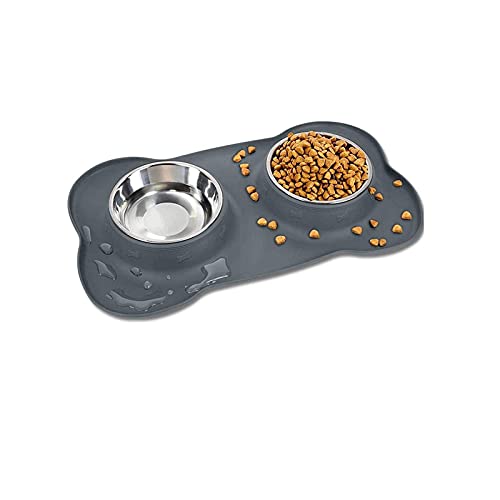 YOKA Dog Bowls Non Slip Stainless Steel Double Bowl with Non-Spill Silicone Mats Tray for Cats Dogs Puppies Food Water…
YOKA Dog Bowls Non Slip Stainless Steel Double Bowl with Non-Spill Silicone Mats Tray for Cats Dogs Puppies Food Water… -
 SUOXU 2 Stainless Steel Dog Bowls, Dog Feeding Bowls, Dog Plate Bowls With Non-slip Rubber Bases,Small Pet Feeder Bowls…
SUOXU 2 Stainless Steel Dog Bowls, Dog Feeding Bowls, Dog Plate Bowls With Non-slip Rubber Bases,Small Pet Feeder Bowls… -
 Raised Dog Bowl Adjustable 3 Heights Stands with 2 x 1140ml Stainless Steel Dishes Bowls On Stands for Large Dogs…
Raised Dog Bowl Adjustable 3 Heights Stands with 2 x 1140ml Stainless Steel Dishes Bowls On Stands for Large Dogs…
Sleeping

Make suitable sleeping accommodations for your puppy because he or she will require a lot of rest. Even on the first night with your new puppy, avoid the temptation to let your new puppy sleep in your bed. It will quickly become a habit you will come to regret when they are unable to sleep alone. Using a crate is a great option to provide a safe sleeping space. It’s important to provide them with a cosy haven that they can call their own, where they can develop a routine for each night. You may have to sleep close to the crate for the first few nights to provide a sense of security. As the puppy’s sleep training progresses and he or she becomes accustomed to sleeping on his or her bed, you can gradually move to a separate sleeping area.
Latest Products: Dog Crates
-
 Ellie-Bo Dog Crate Dog Cage from Small to Large, Foldable Puppy Dog Crates , Cage Furniture with Non-Chew Metal…
Ellie-Bo Dog Crate Dog Cage from Small to Large, Foldable Puppy Dog Crates , Cage Furniture with Non-Chew Metal… -
 MidWest Life Stages Single-Door Folding Metal Dog Crate, 36 inches by 24 inches by 27 inches
MidWest Life Stages Single-Door Folding Metal Dog Crate, 36 inches by 24 inches by 27 inches -
 MidWest iCrate Folding Metal Dog Crate
MidWest iCrate Folding Metal Dog Crate -
 Petsfit Dog Crate, Sturdy Frame and Ventilation Mesh,Large Dog Crate for Car Travel,Fleece Mat Rolling Curtain Dog…
Petsfit Dog Crate, Sturdy Frame and Ventilation Mesh,Large Dog Crate for Car Travel,Fleece Mat Rolling Curtain Dog…
Puppy Training

From the minute you bring your golden retriever pup home you can begin puppy training. Puppies begin to learn from birth, and good breeders begin to handle and socialize them right away. Some puppy training can start as soon as the puppy is able to open his eyes and walk. Young puppies are less focused, but by 7 to 8 weeks of age, they should be learning basic obedience cues like “sit,” “down,” and “stay.”
Latest Products: Training Aids
-
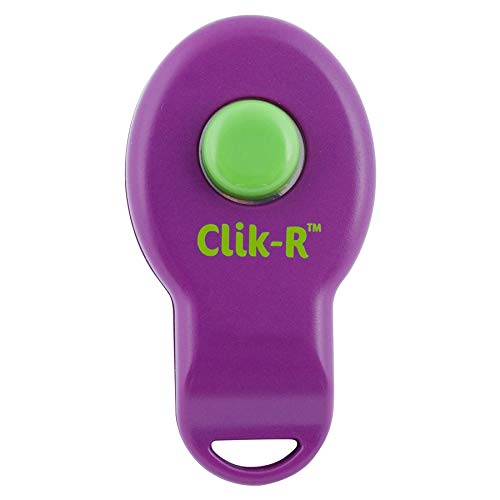 PetSafe Clik-R Training Tool, Training Clicker for Dogs, Reinforces Positive Behaviour, Comfortable Grip, Training Guide…
PetSafe Clik-R Training Tool, Training Clicker for Dogs, Reinforces Positive Behaviour, Comfortable Grip, Training Guide… -
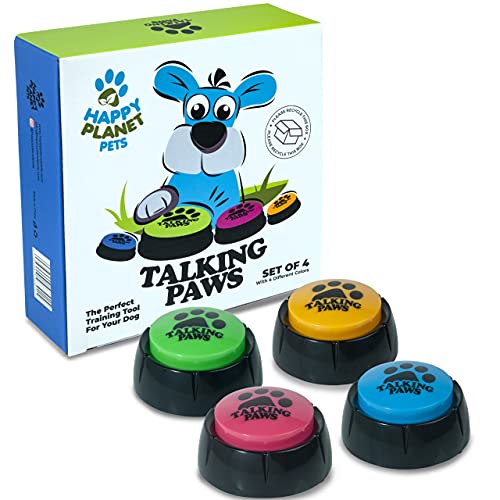 Talking Paws – Recordable Training Buttons for Dogs, Puppy & Pets. Free Stickers. Train Your Dog Easily To Press Buzzers…
Talking Paws – Recordable Training Buttons for Dogs, Puppy & Pets. Free Stickers. Train Your Dog Easily To Press Buzzers… -
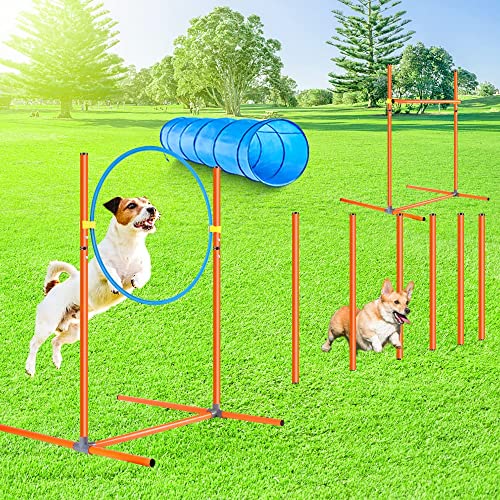 X XBEN Upgraded Dog Agility Equipment Kit – Dog Agility Obstacle Training Courses with 60CM Dog Tunnel, 8 PCS Agility…
X XBEN Upgraded Dog Agility Equipment Kit – Dog Agility Obstacle Training Courses with 60CM Dog Tunnel, 8 PCS Agility… -
![Diyife Dog Clicker, [4 PCS, Multi-Color] Dog Training Clicker with Wrist Strap for Dog Cat Horse Clickers for Dog…](https://m.media-amazon.com/images/I/51I8if9HovL.jpg) Diyife Dog Clicker, [4 PCS, Multi-Color] Dog Training Clicker with Wrist Strap for Dog Cat Horse Clickers for Dog…
Diyife Dog Clicker, [4 PCS, Multi-Color] Dog Training Clicker with Wrist Strap for Dog Cat Horse Clickers for Dog…
Vaccinations & Vet Care
Veterinary care is an essential part of caring for a Golden Retriever puppy, it is important to contact your vet to discuss your puppy’s vaccination schedule. Puppies can start their vaccinations after 6 weeks and usually complete their vaccination schedule at 14 weeks. Puppies should be kept indoors until 2 weeks after their final vaccination. From that point forwards they will require an annual booster.
It is also essential to treat puppies against Roundworms. Puppies should be treated for Roundworms every two weeks until they reach 3 months of age and then once every month until they reach 6 months of age. There are also a range of flea treatment options available, it is important to research what each treatment covers and how long your pet will be protected, and to choose the best option for you.
Exercise

Allowing a Golden Retriever puppy to exercise is an essential part of caring for a Golden Retriever puppy. Exercising gives your puppy a terrific opportunity to mingle with other pups and dogs, as well as people, which is important for their behavioural development. Exercise is not only beneficial to your puppy’s mental and physical health, but it also aids in the development of a deep bond that will last a lifetime.
Latest Products: Dog Toys
-
 Petface Super Tennis Balls For Dogs, Throw and Fetch, Outdoor Exercise, 12 Pack
Petface Super Tennis Balls For Dogs, Throw and Fetch, Outdoor Exercise, 12 Pack -
 PetDroid Interactive Dog/Cats Ball Toys,Durable Motion Activated Automatic Rolling Ball Toys for Puppy/Small/Medium Dogs…
PetDroid Interactive Dog/Cats Ball Toys,Durable Motion Activated Automatic Rolling Ball Toys for Puppy/Small/Medium Dogs… -
 PETTOM Dog Ball Squeaky Toy Durable Small Dog Chew Toys Balls Waterproof Floating Bouncy Rubber Ball with Squeaky Sound…
PETTOM Dog Ball Squeaky Toy Durable Small Dog Chew Toys Balls Waterproof Floating Bouncy Rubber Ball with Squeaky Sound… -
 PAWISE Dog Ball Launcher Dog Fetch Toy Dog Tennis Ball Thrower
PAWISE Dog Ball Launcher Dog Fetch Toy Dog Tennis Ball Thrower
Socialization

Socialization is the process of teaching your puppy that the world is a safe place with kind people and pets, and that new encounters should not be frightening. This is accomplished by carefully handling the puppy during the first three months of its existence. Proper socialization can help a puppy avoid being terrified of things like children or riding in a car, allowing him or her to grow into a well-mannered, decent companion.
Grooming a puppy

Grooming a puppy and keeping it healthy and glowing requires more than a simple brush. In addition to brushing your puppy, bathing, ear cleaning, eye care, nail trimming and even brushing teeth, are all part of puppy grooming.
Latest Products: Dog Grooming
-
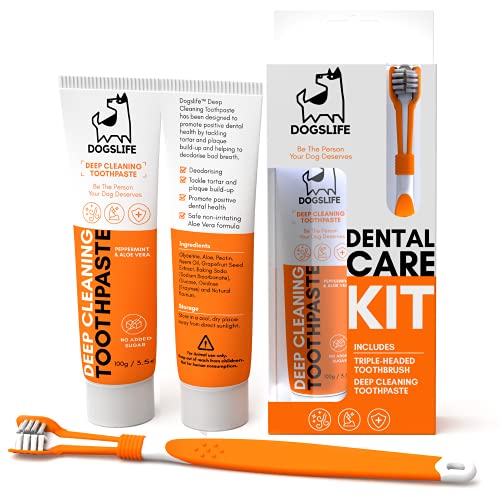 Dog Toothbrush with Toothpaste | Approved Dog Dental Kit | Triple Headed Deep Cleaning Toothbrush for Dogs + 100…
Dog Toothbrush with Toothpaste | Approved Dog Dental Kit | Triple Headed Deep Cleaning Toothbrush for Dogs + 100… -
 PetSol Dental Care Kit for Dogs & Cats Toothpaste (100g) with 3 x Pet Toothbrushes to Clean Pet’s Teeth, Remove Plaque…
PetSol Dental Care Kit for Dogs & Cats Toothpaste (100g) with 3 x Pet Toothbrushes to Clean Pet’s Teeth, Remove Plaque… -
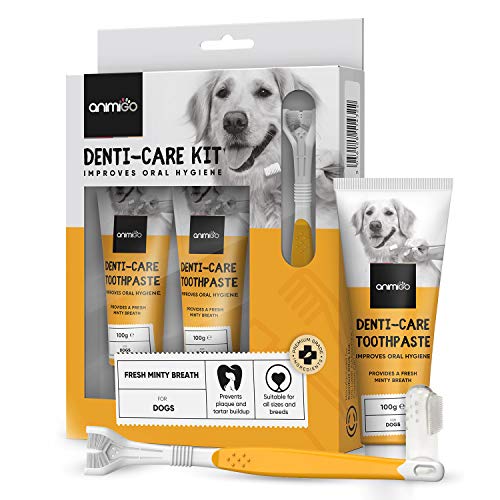 Dog Toothbrush and Toothpaste Kit – 2X Dog Toothpaste for Plaque and Fresh Breath (100g Each), 1x Triple-Head Dog Tooth…
Dog Toothbrush and Toothpaste Kit – 2X Dog Toothpaste for Plaque and Fresh Breath (100g Each), 1x Triple-Head Dog Tooth… -
 Beaphar | Toothbrush & Toothpaste Dental Care Kit | For Dogs & Cats | Includes a Double-Ended Toothbrush & Liver…
Beaphar | Toothbrush & Toothpaste Dental Care Kit | For Dogs & Cats | Includes a Double-Ended Toothbrush & Liver…
Puppy Stages
A puppy goes through five phases of development and growth.
| Neonatal stage: | 0 to 2 weeks |
| Transitional stage | 2 to 4 weeks |
| Socialization stage | 3 to 16 weeks |
| Ranking/testing stage | 4 to 6 months |
| Adolescent stage | 6 to 18 months |
In Conclusion: Things to consider when caring for a Golden Retriever puppy
- Golden Retrievers need a lot of love and attention to be happy and any dog owner knows that there is never enough time with their pet.
- Golden Retrievers immediately become your best friend. Because of the beauty of both the interior and outside of this lovely breed, most owners have more than one!
- Remember that if you allow your golden retriever to have some freedom by allowing them to do activities they enjoy, such as meeting new people and swimming, you will be rewarded with a happy dog.
Latest Products: Books about Golden Retrievers
-
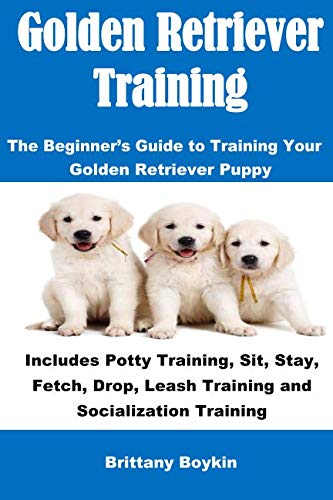 Golden Retriever Training: The Beginner’s Guide to Training Your Golden Retriever Puppy: Includes Potty Training, Sit…
Golden Retriever Training: The Beginner’s Guide to Training Your Golden Retriever Puppy: Includes Potty Training, Sit… -
 The Complete Guide to Golden Retrievers: Finding, Raising, Training, and Loving Your Golden Retriever Puppy
The Complete Guide to Golden Retrievers: Finding, Raising, Training, and Loving Your Golden Retriever Puppy -
 The Complete Golden Retriever Handbook: The Essential Guide for New & Prospective Golden Retriever Owners (Canine…
The Complete Golden Retriever Handbook: The Essential Guide for New & Prospective Golden Retriever Owners (Canine…





